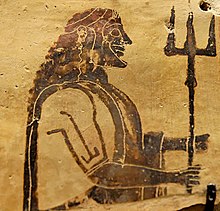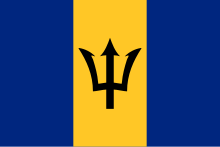Trident of Poseidon

The trident of Poseidon and his Roman equivalent,
Myths

In
Poseidon wields his trident on a number of occasions. He used his trident to strike a rock upon the hill of the Acropolis, producing a well of seawater, in what developed into a contest between him and Athena over possession of Attica. When he lost, Poseidon used the trident to dry out the land so they had no water. The well was later to be called the Erechtheis.[3][4][5] There is further myth that Poseidon (Neptune) produced a horse by striking the earth with the trident, in order to bolster his claim,[6] but there is no attestation for this among Greek writers.[7] The alleged trident print on a rock and the sea well within the Erechtheion were witnessed by the geographer Pausanias while visiting Athens.[b][8][3][7]
In another myth, Poseidon creates a spring or springs with the strike of his trident to reward Amymone for her encounter with him.[9] In a version of another myth Poseidon wields his trident to scare off a satyr who tries to rape Amymone after she mistakenly hits him with a hunting spear.[9]
There is also a myth where Poseidon touches the island of Delos with his trident, affixing it firmly to the sea floor.[10] Another myth tells how Poseidon, enraged by sacrilegious behavior of Ajax the Lesser, uses the trident to split the rock to which Ajax was clinging.
The oldest coins of
Symbolism
According to the second and third
The trident of Neptune was viewed by Roman scholar
Modern scholarship
The view shared by Friedrich Wieseler, E. M. W. Tillyard and several other researchers is that Poseidon's trident is a fish spear, typical for coast-dwelling Greeks.[13]
According to Robert Graves, however, both Poseidon's trident and Zeus's thunderbolt were originally a sacred labrys, but later distinguished from each other when Poseidon became god of the sea, while Zeus claimed the right to the thunderbolt.[14]
According to a competing proposal by H. B. Walters, Poseidon's trident is derived from Zeus's lotus scepter, with Poseidon being Zeus in his marine aspect.[13]
Modern references

In present times, Poseidon's trident is a recurring symbol. It appears on the coat of arms of
The personification of Great Britain, Britannia is depicted with the trident of Poseidon as a symbol of naval power. The broken tip of the trident appears on the flag of Barbados. In this instance, the reference is to its use as Britannia's trident, broken to symbolise the end of Britain's colonial rule.
The logo of car manufacturer Maserati is based on the trident from the statue of Neptune in Bologna.[16]
The trident also appears multiple times in popular culture. Poseidon's trident is owned by
See also
Explanatory notes
References
Citations
- Perseus Project.
- Perseus Project.
- ^ ISBN 978-1782976356.
- Perseus Project.
- ISBN 978-0-521-41786-0.
- ^ Virgil, Georgics 1.12ff apud Frazer tr. (1921), 2:79 and note 2.
- ^ a b Frazer tr. (1921), 2:79 and note 2.
- ^ Pausanias, Description of Greece 1.26.
- ^ ISBN 0415186366.
- ISBN 1884964028.
- ISBN 978-1438126395.
- ^ ISBN 978-1136797385.
- ^ ISBN 978-1107605565.
- ISBN 978-6155530814.
- ^ "Trident II D-5". Atomic Archive. Retrieved 19 March 2015.
- ^ "History". Maserati. Archived from the original on 4 June 2016. Retrieved 8 Jan 2016.
- ^ "The Shards of Heaven by Michael Livingston". Publishers Weekly. Retrieved January 29, 2016.
- ^ "Review: The Shards of Heaven by Michael Livingston". Kirkus Reviews. September 3, 2015. Retrieved January 29, 2016.
General and cited references
- ISBN 9780674991361.; Vol. 2.
